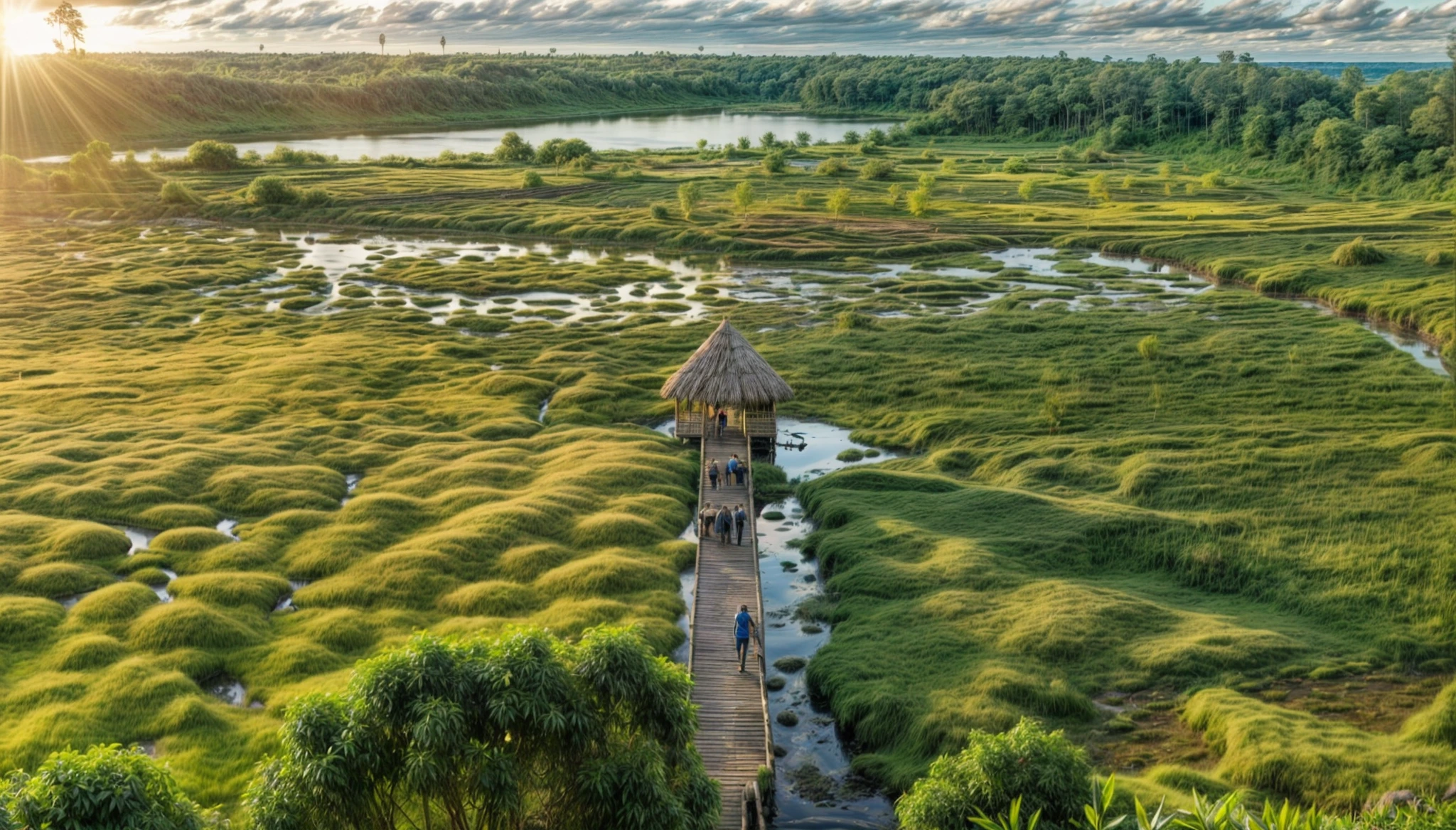
5 minute read
FUVAHMULAH: WHERE MALDIVES MEETS WILD WATERS
Fuvahmulah, a solitary island in the Maldives’ southern Gnaviyani Atoll, breaks free from the Maldives’ resort-saturated stereotype. Far from the multi-island bustle of Addu or the tourist-heavy northern atolls, Fuvahmulah stands alone, a 4.5-kilometer ribbon of volcanic lushness just south of the equator. As of April 11, 2025, this vibrant speck is staking its claim as a haven for travelers chasing unfiltered nature, rich culture, and pulse-quickening adventure. With its distinct geology, layered past, and a tourism scene that marries rustic charm with quiet ambition, Fuvahmulah crafts a Maldives experience that’s as soulful as it is unforgettable.
Unlike the Maldives’ low-lying coral atolls, Fuvahmulah rises boldly from the ocean, its volcanic roots fueling fertile soil that bursts with tropical abundance—banana groves, taro fields, and breadfruit trees flourish alongside vivid hibiscus and frangipani. Known as the “Maldives’ garden,” the island cradles two freshwater lakes, Dhadimagi Kilhi and Bandaara Kilhi, rare jewels of Maldives. These tranquil pools, edged with reeds and teeming with birdlife, join Fuvahmulah’s Southern Hemisphere perch to mark it as a geographic standout, revered for its singular beauty. Its history carries a defiant edge, shaped by centuries of maritime trade and a fleeting bid for independence. In the late 1950s, Fuvahmulah rallied with Addu in the short-lived United Suvadive Republic, a bold rebellion against Malé’s grip that left echoes of resilience in its identity. Traces of a deeper past—ancient Buddhist relics like a vanished stupa—hint at pre-Islamic roots, weaving mystery into the island’s quiet villages and lively markets.
The island’s marine realm is a global magnet, especially for divers drawn to its reputation as a tiger shark sanctuary. The Fuvahmulah Tiger Shark Project, a cornerstone of local conservation, has made “Tiger Zoo”—a prime dive site—synonymous with close encounters with these majestic predators, alongside oceanic whitetips and hammerhead schools. Without a protective reef lagoon, Fuvahmulah faces the open ocean, fostering dynamic waters where pelagics thrive. Diving is a year-round draw, though the dry season, November to April, delivers calmer seas and visibility stretching past 30 meters. Above water, Thoondu Beach captivates with its black-pebble shore, a volcanic relic polished by centuries of waves, standing in stark contrast to the Maldives’ usual white sands. Nearby, a “spray phenomenon” at Dhadimagi Kilhi sees ocean surges erupt through underground channels in misty geysers during rough seas—a vivid pulse of the island’s wild spirit.
Fuvahmulah’s tourism dreams are taking root, fueled by a community eager to share its treasures while safeguarding its essence. While sprawling resorts dominate elsewhere, here guesthouses in villages like Dhadimagu and Funaadu offer intimate stays—family-run havens with a handful of rooms, dishing up home-cooked meals and guided adventures. These affordable lodgings cater to travelers seeking immersion over isolation, blending cultural exchange with access to the island’s hotspots. A boutique hotel, slated for completion in late 2025, signals rising interest, but Fuvahmulah’s heart lies in its sustainable ethos. The Fuvahmulah City Council partners with eco-conscious operators to protect reefs and wetlands, ensuring tourism lifts locals without erasing heritage. With only a fraction of the Maldives’ 1.5 million annual visitors venturing south, the island retains a near-secret allure, cherished by divers, surfers, and those craving unpolished beauty.
Beyond the waves, Fuvahmulah’s interior beckons with a wilder charm. Its wetlands and lakes hum with life—egrets, herons, and the iconic Maldivian white tern weave through dense greenery, while guided buggy tours and walking trails reveal the island’s untamed core. Surfers are catching on, flocking to exposed shores for uncrowded swells that rival the Maldives’ best breaks. For history buffs, the island’s past comes alive in unexpected places: old mosques with coral-stone minarets nod to centuries of faith, while the Kedeyre Miskiy, one of the Maldives’ oldest, stands as a testament to Fuvahmulah’s enduring spirit. The island’s equatorial crossing, celebrated with keepsake certificates at guesthouses, adds a playful twist to its geographic bragging rights. These draws—natural, historical, and cultural—make Fuvahmulah a mosaic of experiences, where a single day might blend shark dives, village strolls, and moments marveling at a lake’s quiet ripple.
The island’s culture thrums with pride, its Dhivehi dialect singing with a cadence unique even among southern atolls. Villages like Hoadhadu and Funaadu pulse with daily life—fishermen hauling catches, women weaving palm fronds into mats, children darting beneath mango trees. Guesthouse guests dive into this world, sharing cups of sai or learning the rhythmic beat of boduberu drums. The cuisine is a revelation, rooted in fresh tuna but elevated by local flair—spicy kuli boakibaa, smoky mas huni, and coconut flatbreads paired with taro and fiery chilies from the island’s fertile fields. Meals at family-run eateries come with stories of the day’s haul or the island’s lore, a far cry from resort buffets. Festivals like Eid ignite the community with music, dance, and feasts that often sweep visitors into the celebration, forging connections that linger long after departure.
Getting to Fuvahmulah is smoother than ever. Fuvahmulah Airport welcomes daily 70-minute flights from Malé via Maldivian airlines, offering breathtaking views of turquoise atolls scattered below. International connections through Malé are seamless, with whispers of direct Colombo routes as demand swells. On the island, scooters and bicycles zip between dive shops, beaches, and villages, while taxis and guided tours cater to those seeking ease. The dry season, November to April, is prime, with 86°F (30°C) days, scant rain, and seas tailored for diving, surfing, or kayaking. Fuvahmulah isn’t a mere detour—it’s a destination that commands attention. Its black beaches, shark-filled depths, emerald heartlands, and storied past rewrite the Maldives’ narrative, offering a raw, multifaceted escape. For those seeking beauty, adventure, and tales that echo beyond the journey, Fuvahmulah shines as the Maldives’ hidden masterpiece, ripe for discovery as it balances its quiet legacy with a vibrant future.






